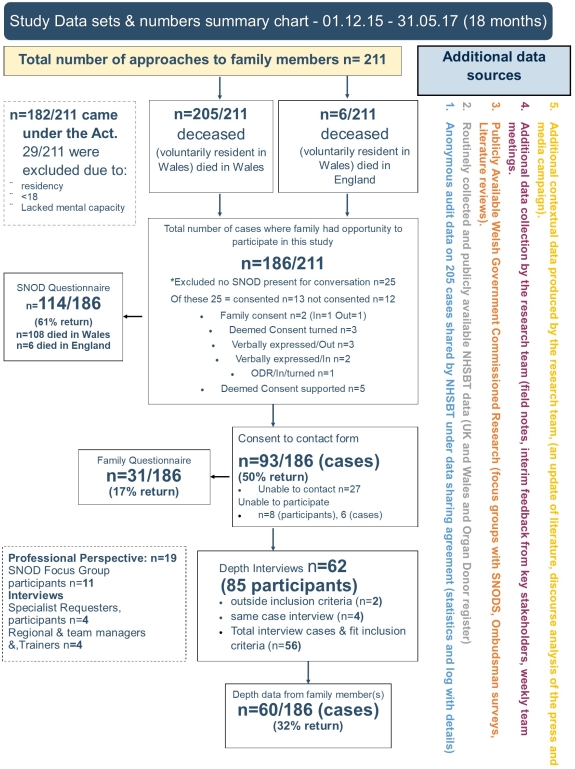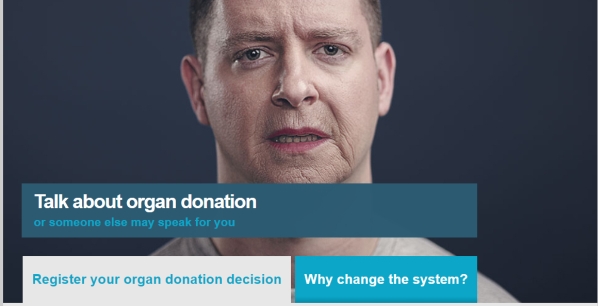What Happened When the 'Soft Opt-Out' to Organ Donation Was Implemented in Wales? Family and Professional Views and Experiences, and Consent Rates for the First 18 Months
L. Mc Laughlin, J. Noyes, K. Morgan, P. Walton, A. Roberts, M. Stephens.
Social Sciences, Bangor University, Bangor, Wales, United Kingdom
Major Health Conditions Policy Team, Welsh Government, Cardiff, Wales, United Kingdom
Organ Donation, NHS Blood and Transplant, Cardiff and Liverpool, Wales, United Kingdom
Nephrology and Transplantation, University Hospital of Wales, Cardiff, Wales, United Kingdom.
Meeting: 2018 American Transplant Congress
Abstract number: B325
Keywords: Donation, Informed consent, Psychosocial, Public policy
Session Information
Session Name: Poster Session B: Non-Organ Specific: Economics, Public Policy, Allocation, Ethics
Session Type: Poster Session
Date: Sunday, June 3, 2018
Session Time: 6:00pm-7:00pm
 Presentation Time: 6:00pm-7:00pm
Presentation Time: 6:00pm-7:00pm
Location: Hall 4EF
On 01.12.15 Wales introduced a 'soft opt-out' system of organ donation.
Co-productive, mixed-methods study partnered with NHS Blood and Transplant and patient and public representatives. Data were collected on all 211 approaches between 01.012.15-31.05.17:182/211 deceased patients came under the Act. Depth data (62 interviews with 85 family members, & questionnaires) on 60 patients who were potential/actual organ donors; and 2 focus group/individual interviews with 19 NHS BT professionals.  Organ Donor Register (ODR) activity was monitored.
Organ Donor Register (ODR) activity was monitored.
Results: Consent rates increased by around 10% to 61%; 64% when family consent was removed. This was higher than England and has reversed an unexplained drop to 48.5% before implementation. However, family member(s) still overrode the patient's organ donation decision 31/205 times. 46/205 cases had their consent deemed with a consent rate of 61%. The Act provided a useful framework but family members did not fully understand deemed consent. Negative personal organ donation views and health systems issues affected support for organ donation. The media campaign missed the changed role of the family; that they were no longer the decision maker about organ donation. ODR 'opt-outs' were 6%, less than anticipated.
Discussion: The media campaign mostly worked but was not memorable and had gaps. More work is needed to inform the family about their changed role. As a result of this study Welsh Government commissioned a new campaign launched 01.11.17 
CITATION INFORMATION: Mc Laughlin L., Noyes J., Morgan K., Walton P., Roberts A., Stephens M. What Happened When the 'Soft Opt-Out' to Organ Donation Was Implemented in Wales? Family and Professional Views and Experiences, and Consent Rates for the First 18 Months Am J Transplant. 2017;17 (suppl 3).
To cite this abstract in AMA style:
Laughlin LMc, Noyes J, Morgan K, Walton P, Roberts A, Stephens M. What Happened When the 'Soft Opt-Out' to Organ Donation Was Implemented in Wales? Family and Professional Views and Experiences, and Consent Rates for the First 18 Months [abstract]. https://atcmeetingabstracts.com/abstract/what-happened-when-the-soft-opt-out-to-organ-donation-was-implemented-in-wales-family-and-professional-views-and-experiences-and-consent-rates-for-the-first-18-months/. Accessed January 15, 2026.« Back to 2018 American Transplant Congress
